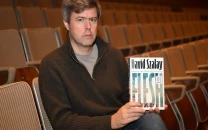Anurag Kashyap 'suffered two heart attacks, lengthy depression' after Netflix shuttered project
Regardless, filmmaker remains determined to bring project to fruition
1700638866-0/anuragkashmaxcity23-(1)1700638866-0-640x480.webp)
A recently published deep dive by The Washington Post, which shed light on the complexities of Indian cinema, streaming, and the mix of the two with politics, also spoke about ace filmmaker Anurag Kashyap's health issues during a turbulent period of his life.
Kashyap opened up on the significance of his project Maximum City - his "magnum opus," as the article described it - expressing his disappointment over its departure from Netflix whilst reflecting on the challenges faced in the streaming industry.
Kashyap, known for his bold and impactful storytelling, stated about Maximum City, "It was my best work. I’ve never done such honest, important work." However, he revealed that Netflix's decision to part ways with the project lacked specific reasoning, leaving him to speculate whether the content became too sensitive or if he had become a sensitive figure for the streaming platform.
The filmmaker shared his deep involvement in the creation of Maximum City, spending mornings at his dining room table in Mumbai, fervently writing and filling pages with his expansive Hindi handwriting. He expressed a sense of heartbreak when Netflix walked away from the project, linking the development to the aftermath of the Tandav controversy and tax-related controversies surrounding his former production company.
The Tandav saga disrupted the industry just weeks before preproduction for Maximum City, and Kashyap found himself entangled in tax-related controversies, with officials raiding locations associated with his production company. Critics argued that such investigations have been politically motivated under the Modi government, and Kashyap denies any wrongdoing.
Following Netflix's departure from Maximum City, Kashyap faced personal and professional challenges, including a period of depression. He drank heavily and suffered two heart attacks. “Maximum City was where all my energy went,” he said. “I was heartbroken. I totally lost it.” Shunned by investors, he used personal savings and borrowed money to complete his next film, a revised version of a drama about an interfaith couple that ultimately failed to resonate with audiences.
Reflecting on the trajectory of his career and the disappointments faced in the streaming industry, Kashyap expressed frustration over what he referred to as "invisible censorship." He compared the unfulfilled promise of streaming as a revolutionary space to social media's initial goals of empowerment turning into a tool.
Despite setbacks, Kashyap is on a path to recovery, actively engaging in writing and working on a project with Netflix that avoids direct engagement with contemporary issues. He recently completed Kennedy, funded by Zee, an Indian conglomerate, incorporating veiled criticism of Indian politics and the government's handling of the pandemic.
Notably, Kashyap remains determined to bring Maximum City to fruition, drawing inspiration from filmmakers in Iran and China who navigate challenging political landscapes to create daring works. As he navigates the complexities of the industry, Kashyap's resilience and commitment to his craft remain unwavering. “They still find ways to do it,” he said. “So why can’t I?”
All of this followed an Amazon Prime Video controversy, where the highly anticipated web series, Tandav found itself facing backlash since its release on January 15, 2021. The series, written by Gaurav Solanki of Article 15 fame, faced criticism and trolling, primarily for allegedly hurting religious sentiments.
At the centre of the controversy was a scene featuring Mohd Zeeshan Ayyub, dressed as Shiva, delivering lines related to freedom. This particular sequence sparked numerous complaints, leading the makers to issue a statement apologizing for unintentionally causing offence and committing to edit out "problematic" segments. Despite these measures, Tandav continued to face challenges.
Have something to add? Share it in the comments



















COMMENTS
Comments are moderated and generally will be posted if they are on-topic and not abusive.
For more information, please see our Comments FAQ